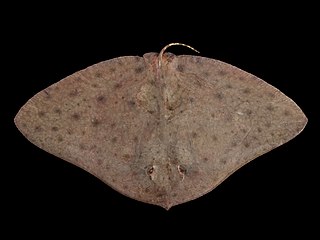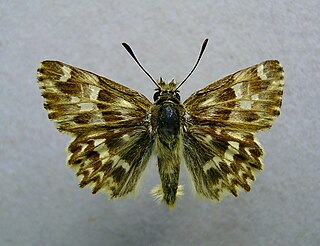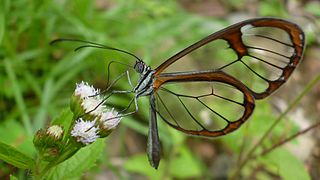
The Pieridae are a large family of butterflies with about 76 genera containing about 1,100 species, mostly from tropical Africa and tropical Asia with some varieties in the more northern regions of North America and Eurasia. Most pierid butterflies are white, yellow, or orange in coloration, often with black spots. The pigments that give the distinct coloring to these butterflies are derived from waste products in the body and are a characteristic of this family. The family was created by William John Swainson in 1820.

The butterfly rays are the rays forming the genus Gymnura and the family Gymnuridae. They are found in warm oceans worldwide, and occasionally in estuaries.

Epicopeiidae is a family of insects in the order Lepidoptera. They are known as oriental swallowtail moths as they closely resemble some oriental swallowtail butterflies. Epicopeiidae have highly varied structure in regards to body size and wing shape. Epicopeiidaen wing patterns are involved in complicated mimicry rings.

Brachodidae is a family of day-flying moths, commonly known as little bear moths, which contains about 135 species distributed around much of the world. The relationships and status of the presently included genera are not well understood.

Glossata is the suborder of the insect order Lepidoptera that contains most lepidopteran species and includes all the superfamilies of moths and butterflies that have a coilable proboscis..

Libythea labdaca, the African snout butterfly, is a member of the butterfly subfamily Libytheinae found in western and central Africa.

Ministrymon is a genus of butterflies in the family Lycaenidae. The species of this genus are found in the Nearctic and Neotropical realms.

Muschampia lavatherae, the marbled skipper, is a butterfly of the family Hesperiidae. It is found from the Rhine Rift Valley in central Germany up to North Africa and from south-eastern France up to Anatolia.

Cyllonium is a genus of extinct insects. It contains two species.

Ministrymon janevicroy, the Vicroy's ministreak, is a butterfly in the family Lycaenidae. It is found from the southern United States (Texas) to Costa Rica (Guanacaste). There are disjunct populations on the Venezuelan islands of Curaçao and Isla Margarita. The habitat consists of dry deciduous forests and scrubs.

Ministrymon azia, the gray ministreak, is a butterfly in the family Lycaenidae. It is found from the southern United States to southern Brazil, Paraguay and Argentina. It is found in virtually all lowland habitats, ranging from deserts in coastal Peru and Chile to rainforests in the Amazon basin.

Ministrymon clytie, the Clytie hairstreak, is a butterfly of the family Lycaenidae. It was described by William Henry Edwards in 1877. It is found from southern Arizona, New Mexico and Texas to Mexico, Guatemala and Costa Rica. The habitat consists of tropical forest openings and subtropical thorn forests.

Ministrymon leda, the leda ministreak, is a species of hairstreak in the butterfly family Lycaenidae. It is found in North America.\

Pseudoscada erruca is a South-American species of brush-footed butterfly in the Godyridina subtribe of Ithomiini. It was described in 1855 by William Chapman Hewitson as Ithomia erruca.
The Macroheterocera are a well supported clade of moths that are closely related to butterflies and macro-moths.














